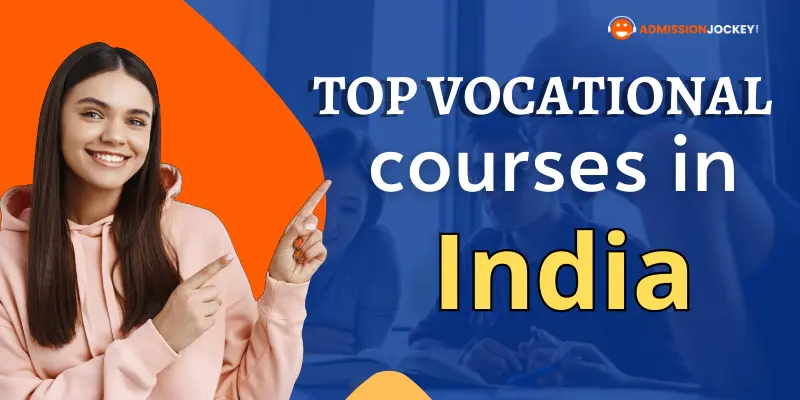Top vocational courses in India
By admin | Last Updated Jun, 2023

Top vocational courses in India after 12th
After completing 12th students generally go for the searching of college or take a gap year. No one focus on their skills. It is not the mistake of the students but our education policy that students are just focused on academics and not on their skills. A significant life milestone is the completion of high school. Most of the bachelor’s degrees take about 3-4 years, or even longer. These courses cover a wider range of subjects. It helps students get a complete knowledge of their field of study.
Vocational courses are more targeted and focused on a niche audience, with only the most relevant subject matter covered. A vocational course can help you kick-start a career in a specific job. Practical skills are just as necessary in today’s competitive corporate environment as academic knowledge. After the completion of 12TH, vocational programs provide excellent chances to advance your knowledge and skills so that you are prepared for a career in the job market.
Vocational courses:
Vocational courses focus on developing students’ market skills in a variety of areas with the goal of getting them ready for focused careers. As they are closely tied to corporate requirements, these courses are helpful in professional development. Vocational training programs are able to prove a candidate’s knowledge of the fundamental abilities needed for a given career. Vocational training program are designed to give students the skills they need to be ready for the jobs they want.
Top vocational courses in India
Listed down are some of the vocational courses which students can pursue after 12th in India.
1. Tradesman:
These include carpentry, plumbing, home remodeling, and tool use. With this training, you will be certified and prepared to work as a general tradesman, performing various maintenance tasks, creating furniture, and other identical crafts. There are numerous career opportunities available, including plumbing services, home remodeling, and self-employment.
2. Hospitality:
A bachelor’s degree in hotel management will cover all the duties over a number of years because the hospitality industry covers many different industries under just a single term. You can, however, decide to skip the extended period and instead enroll in specialized diplomas or practical courses in a variety of fields, including baking and confectionery, housekeeping, catering management, food and beverage service, culinary, hospitality and much more. These certificates last less time and usually cost less than a full degree because they only cover one subject. Restaurants, and catering businesses, hotels, resorts are just a few places you can work.
3. Photography:
The areas of photography, fashion and advertisements, nature and wildlife, travel, and event photography are where this branch of study might lead to a profession. A career in website design might also begin as an assistant photographer, in a web design company, or as an independent professional. It is well known that photography is an exciting profession that calls for the taking of interesting pictures.
4. Beautician Course:
Skincare and beauty products are currently popular. The demand for beauticians and stylists is rising as more and more individuals become self-conscious concerning the way they look. Additionally, one can pursue certifications in electrolysis, cosmetology, hairstyling, aesthetics, manicures, and pedicures. After completing the course, the educated professional has the option of opening their own parlor, working in a beauty or skincare business, or both.
5. Language Expert:
People who speak two or more languages fluently should enroll in this type of practical course. This typically means that you must be a natural speaker of one language or possess a bachelor’s degree. In a foreign country, many businesses and even government organizations employ local staff members as well as translators, interpreting professionals, and teachers of other languages. This up skilling training may be beneficial to increase your work possibilities.
6. Gym/Physical Education:
The need for a qualified fitness coach is growing among the nation’s young people. With a number of vocational courses in the area of physical fitness, students can now explore more about physical education, a subject that is essential to a child’s whole development. If one does this vocational training, there are also several employment choices in health clubs, gyms, sports academies, and businesses that produce sporting goods.
Get More Details About The Importance of Career Counseling for Class 12th
Benefits of vocational courses:
- The main emphasis is on specialized skills.
- A realistic understanding of the field in which the training is provided.
- Highly fascinating because they use practical knowledge to inform students of current developments in the worldwide market.
- Serve as a link between the market’s supply and demand for skilled labor.
- The supplied program is shortened, less expensive, and specific to the demands of the sector.
- The majority of the program demand high school graduation and modest English and math skills.
- Due to the convenient and simple learning method, they can also be taken online.
Conclusion:
In today’s evolving job market, vocational education is essential. These specialized courses give students the knowledge and skills they require to be successful in particular industries and professions. Employers are increasingly looking for people with practical experience as well as relevant training, which are driving up the demand for occupational skills. There are many top vocational courses in India which we have listed above. There are many advantages for students doing vocational courses. They often take less time than normal academic programs, enabling people to enter the workforce faster.
FAQs
- What are the skills required for vocational courses?
Skills required for vocational courses are related to the particular discipline. Students can choose the vocational courses as per their interests.
- What is the duration of vocational courses?
The duration of the vocational course is usually 1-2 years. However, students must check the entire vocational course details before enrolling in any program.
- What is the minimum eligibility for a vocational course?
The minimum qualification for a vocational course is class 8. But students must go through the course details before taking admitted to any vocational course.
- Can I take more than one vocational course at once?
Depending on your institution and field of study, you can combine courses, take several classes, or even enroll in a vocational program alongside your bachelor’s degree. There may be rules against this in some institutions.

